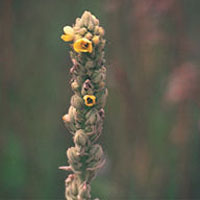Mullein
 © Eric Yarnell
© Eric YarnellParts Used & Where Grown
Mullein is native to much of Europe and Asia and is naturalized to North America. There are over 360 species of Verbascum with V. thapsus, V. phlomides, and V. densiflorum mentioned most often in herbal texts. The leaves and flowers are both used medicinally.
- Reliable and relatively consistent scientific data showing a substantial health benefit.
- Contradictory, insufficient, or preliminary studies suggesting a health benefit or minimal health benefit.
- For an herb, supported by traditional use but minimal or no scientific evidence. For a supplement, little scientific support.
Our proprietary “Star-Rating” system was developed to help you easily understand the amount of scientific support behind each supplement in relation to a specific health condition. While there is no way to predict whether a vitamin, mineral, or herb will successfully treat or prevent associated health conditions, our unique ratings tell you how well these supplements are understood by the medical community, and whether studies have found them to be effective for other people.
For over a decade, our team has combed through thousands of research articles published in reputable journals. To help you make educated decisions, and to better understand controversial or confusing supplements, our medical experts have digested the science into these three easy-to-follow ratings. We hope this provides you with a helpful resource to make informed decisions towards your health and well-being.
This supplement has been used in connection with the following health conditions:
| Used for | Amount | Why |
|---|---|---|
Asthma | Refer to label instructions | Mullein, which has a soothing effect on bronchioles, has traditionally been used for asthma. |
Bronchitis | Refer to label instructions | Mullein has been used traditionally as a remedy for the respiratory tract, including bronchitis. It works as an expectorant, meaning it helps expel mucus. |
Chronic Obstructive Pulmonary Disease | Refer to label instructions | Mullein is traditionally used for its ability to promote the discharge of mucus and to soothe mucous membranes. |
Common Cold and Sore Throat | Refer to label instructions | Mullein has soothing and mucus-expelling properties, which accounts for its historical use as a remedy for irritating coughs with bronchial congestion. |
Cough | Refer to label instructions | Mullein has a long history of use for relieving coughs. |
Ear Infections | Refer to label instructions | Ear drops with mullein, St. John’s wort, and garlic in an oil or glycerin base are traditional remedies used to alleviate symptoms, particularly pain, during acute ear infections. |
Traditional Use (May Not Be Supported by Scientific Studies)
Mullein leaves and flowers are classified in traditional herbal literature as expectorants (promotes the discharge of mucus) and demulcents (soothes irritated mucous membranes). Historically, mullein has been used by herbalists as a remedy for the respiratory tract, particularly in cases of irritating coughs with bronchial congestion.1 Some herbal texts extend the therapeutic use to pneumonia and asthma.2 Due to its mucilage content, mullein has also been used topically by herbalists as a soothing emollient for inflammatory skin conditions and burns.
Copyright © 2026 TraceGains, Inc. All rights reserved.
Learn more about TraceGains, the company.
The information presented by TraceGains is for informational purposes only. It is based on scientific studies (human, animal, or in vitro), clinical experience, or traditional usage as cited in each article. The results reported may not necessarily occur in all individuals. Self-treatment is not recommended for life-threatening conditions that require medical treatment under a doctor's care. For many of the conditions discussed, treatment with prescription or over the counter medication is also available. Consult your doctor, practitioner, and/or pharmacist for any health problem and before using any supplements or before making any changes in prescribed medications. Information expires December 2026.
